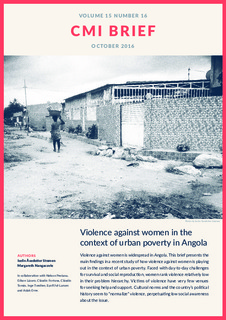Violence against women in the context of urban poverty in Angola
Report
Permanent lenke
http://hdl.handle.net/11250/2475266Utgivelsesdato
2016-10-01Metadata
Vis full innførselSamlinger
- Publications [1488]
Originalversjon
Bergen: Chr. Michelsen Institute (CMI Brief vol. 15 no. 16) 4 p.Sammendrag
Violence against women is widespread in Angola. This brief presents the main findings in a recent study of how violence against women is playing out in the context of urban poverty. Faced with day-to-day challenges for survival and social reproduction, women rank violence relatively low in their problem hierarchy. Victims of violence have very few venues for seeking help and support. Cultural norms and the country’s political history seem to “normalize” violence, perpetuating low social awareness about the issue. This CMI/CEIC Brief emerges from the joint CEIC and CMI research project “Cooperation on Research and Development in Angola”, and is based on qualitative research in two urban poor neighbourhoods (locally known as musseques) in the city capital of Luanda, conducted in February 2016. Introduction Our aim is to assess how violence against women is playing out in the context of poverty; i.e. how poverty and violence is interlinked in women’s own perceptions and experiences, and how these dual factors structure their de facto space for manoeuvre. Our analysis suggests that violence is widespread and that women have very few venues for seeking help and support. Yet, faced with a plethora of day-to-day challenges for survival and social reproduction, women rank violence relatively low in their problem hierarchy. Also, cultural norms and the country’s political history appear to “normalize” violence, thereby perpetuating low social awareness about the issue. Country and legal context In spite of Angola’s status as a middle-income country – due to its vast influx of oil revenues – income distribution is highly asymmetrical and poverty levels are high. The Gini-coefficient is 55.5 1 , whilst rural and urban poverty represent 57 per cent and 19 per cent, respectively. UNDPs Human Development Index lists Angola as number 149 amongst 188 countries, whilst the World B
